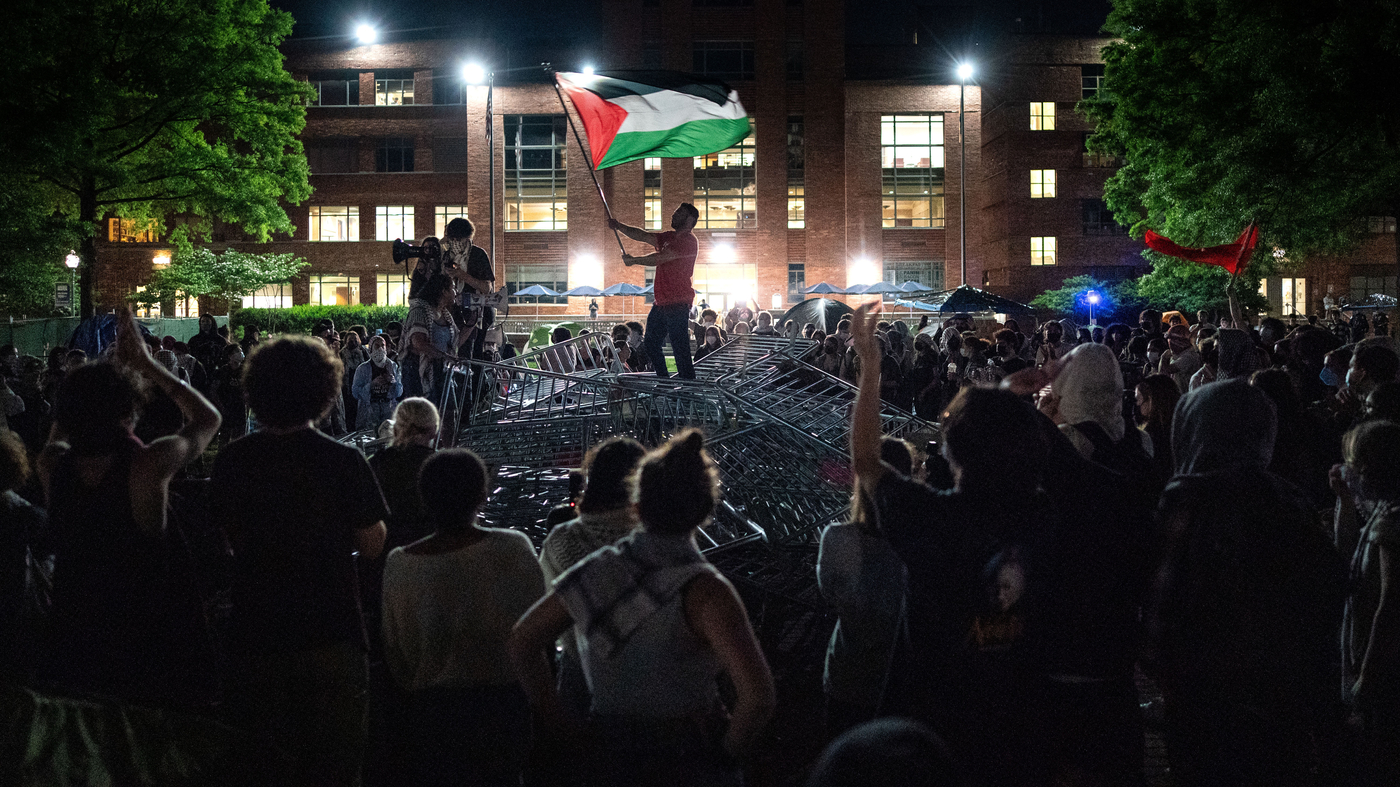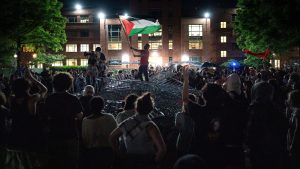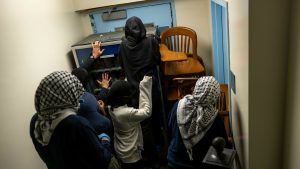
Protesters at Columbia University are occupying a building
Pro-Palestinian protesters in Los Angeles, Washington, and Yale, whose protesters were arrested and suspended last week are expected to return to campus
Pro-Palestinian demonstrators continue to gather at schools, despite the risk of being arrested or faced with suspension, with almost 300 protesters arrested over the weekend.
On Sunday, pro-Palestinian protesters and pro-Israeli protesters clashed at the University of California, Los Angeles, leading to what university leaders described as “physical altercations” and prompting them to increase security measures on campus.
Students and faculty at some universities are calling on their administrations not to discipline protesters. Arrested protesters face uncertainty about not only their legal records but the status of campus housing, financial aid and graduation eligibility.
The school warned of “heavy police activity around the Graduate Life Center” in a series of posts on X (formerly Twitter) starting just after 10 p.m. ET, and announced around 3:30 a.m. that the incident “had stabilized.” Social media footage shows protesters chanting at police as they lead people into multiple white vans.
Protests at George Washington University in D.C. are stretching into their fifth day on Monday — the last day of class for the semester — after a tense weekend, culminating in a clash between protesters and police.
Students started an encampment on University Yard on Thursday and continued it on H Street after barricades were put up to keep people out.
The GW Hatchet reports that the protesters dumped the barricades in the middle of the lawn and flooded the grass with people camped in some 85 tents.
Nearly 300 faculty members at Yale University, where 48 protesters were arrested last week, signed a letter condemning what they called “the criminalization of Yale students engaged in recent acts of peaceful protest.” They demanded that the university stop punishing them, and that the charges against them be dropped.
Officials at the University of Florida, where students began protesting on Wednesday, said Friday that demonstrators could face suspension and a three-year ban from campus if they violate specific protest rules, reports member station WUFT.
Barnard College officials announced Friday that it will allow most of the 53 students who were arrested and suspended after protesting at Columbia University to return to campus. The New York Times reports that suspended students who reached agreements with the college have their access to residence halls, dining facilities and classrooms restored, while others are still working to reach agreements.
On Sunday, Jay Bernhardt, the president of Emerson College in Boston — where more than 100 protesters were arrested at an encampment early Thursday morning — said the college will not bring disciplinary charges against protesters, and will “encourage the district attorney not to pursue charges related to encampment violations.”
He said it is also taking steps to support students who were arrested, including posting bail for them and providing housing support to those who are required to stay local for court appearances after the closing of their dorms.
“The College has tried to keep members of the community safe in these times, but we need to do more,” he stated.
University actions against peaceful protests at UT-Austin, Cal Poly Humboldt, and Pennsylvania: A district attorney’s report on trespassing charges
In Texas, the Travis County district attorney has dropped misdemeanor trespassing charges against all 57 people arrested during a protest at UT-Austin last week, after a judge found insufficient evidence to proceed.
Some schools threaten to take action against students if they don’t comply with instructions to leave camps that they say are against their policies.
They are not allowed to use bullhorns or speakers if they want to amplify their voices, possess weapons or protest inside buildings, but also face vague prohibitions of “no disruption,” according to a list circulating late Thursday.
At Cal Poly Humboldt, officials closed campus to the public on Saturday, several days after student protesters first occupied two academic and administrative buildings. They had previously given protesters until 5 p.m. on Friday to leave with a guarantee of no immediate arrest — but said they would still face consequences.
“This does not, however, eliminate University conduct-related sanctions or legal implications,” officials said in a release. In addition, leaving in this way may reduce the severity of sanctions imposed on the University.
Work and classes will not be able to be had on the campus through the end of the semester. Officials say they are planning for “various scenarios” for commencement.
She said those who broke the rules would face action, including the time, place and manner of protest.
At the University of Pennsylvania, officials say a campus statue was vandalized with antisemitic graffiti and are calling on demonstrators — from Penn and other area schools — to disband.
A group of Penn faculty and Philadelphia-area elected officials signed a letter last week urging university leaders to “respect students’ rights to engage in nonviolent protest” by refraining from calling in law enforcement to make arrests and from filing disciplinary and criminal charges against peaceful protesters at the encampment.
“Threatening students with sanctions of this kind is unconscionable and should not be the means by which Yale responds to peaceful protest,” they added.
Faculty members at three universities in Texas, Georgia and California have passed symbolic votes of no confidence in their leadership, according to the Associated Press.
Columbia University has begun occupying a campus building: The protests on Tuesday morning began in a lobby at the Morningside campus of John Jay Hall
Columbia University asked protesters to clear out an area in support of Palestinians the day before, as they began occupying buildings early Tuesday morning.
The students at Hamilton Hall began moving furniture to a balcony after protesters climbed into open windows at John Jay Hall.
University officials were not immediately available for comment. Though its public safety department was actively responding. People were urged to avoid the Morningside campus on Tuesday if they could.
Columbia set several deadlines to reach an agreement with demonstrators about the encampment, as the school said it violates school policies, is a threat to campus safety, a disturbance to Jewish students and students trying to study and sleep.
Columbia President Minouche Shafik said Monday that the academic leaders and student organizers worked in good faith to get to common ground in the discussions. We wish they had reached a different outcome because of their hard work and dedication.
The protesters are in favor of Palestinians and want Columbia to end its business dealings with Israeli companies.
Columbia said Monday it would not do that, but it did say the school’s Advisory Committee for Socially Responsible Investing will start reviewing new proposals from students. It will give priority to students and provide funding for health and education in Gaza.
The parties agreed that protests would be halted until after reading day, exams, and commencement, as Shafik urged the community to consider that the class of 2024 did not get to attend their high school graduation in person because of the coronaviruses outbreak.
Students will need to submit an application at least two days before a protest, as designated areas will be held.
The Campy Reaction: A Threat to Students, Students and Families of Columbia High Schools, and a Charge of Inobservation of the Civil Rights Act
She said that the campy had caused an “unwelcoming environment” and a hostile environment for Jewish students, and that it violated the Civil Rights Act of 1964.
“Antisemitic language and actions are unacceptable and calls for violence are simply abhorrent,” she said. Many of our Jewish students have found the atmosphere intolerable over the last few weeks. It is a tragedy that many have left campus. I want to make it clear to the students and their families: they’re valued in the Columbia community. This is your campus too.”
While allowing members of the community to speak, she wants to make them feel safe and also protect them against discrimination, and this must also include respecting other’s right to do so.

